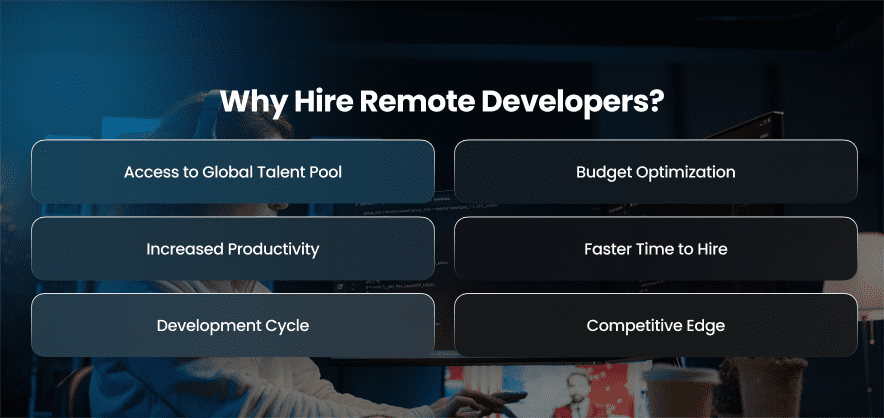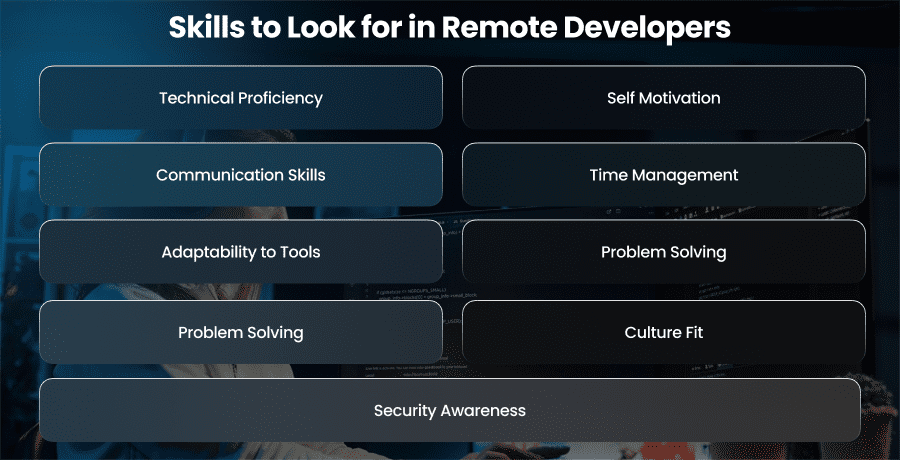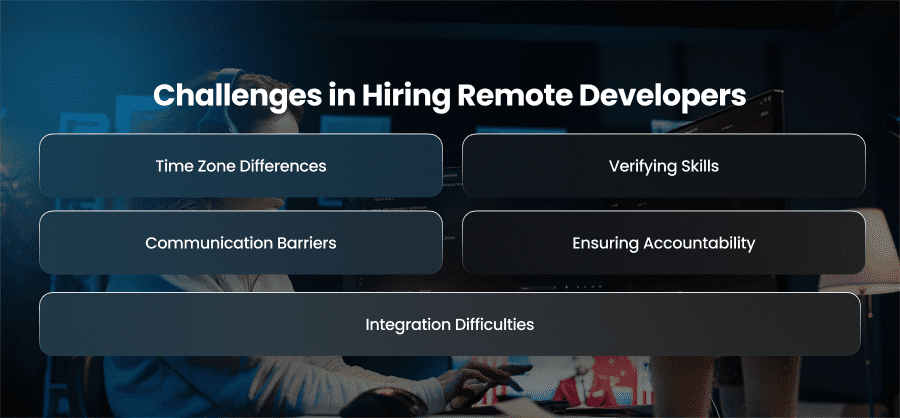According to a survey, about 28% of developers are now working remotely. Furthermore, another survey revealed that 58% of developers now work remotely which is a significant increase from pre pandemic levels.
These facts show that the demand for remote developers continues to increase. This is because of the need for flexibility and access to global talent. Furthermore, cost is another factor that is contributing to the increase in developer demand.
So, in this guide, we’ll look at why hiring remote developers is beneficial. Moreover, we’ll also explore the process of hiring remote developers.
Why Hire Remote Developers?

Access to Global Talent Pool
Reaching additional markets is one of the main benefits of using remote developers. Companies may find qualified developers from all around the world rather than being confined to a small talent pool. Additionally, this worldwide reach makes it easier to locate engineers with specialized knowledge of AI and ML or with the right tech stacks. Also, skills include blockchain and cybersecurity.
Furthermore, it’s easier than ever to find developers who are both and are also culturally aligned and experienced in remote collaboration.
Budget Optimization
Remote hiring can help businesses save substantial costs without compromising on quality. Moreover, businesses don’t have to invest in office space or utilities for developers.
Furthermore, developers in different regions can have varying salary expectations due to cost of living differences. Hence, this allows companies to optimize budgets while still offering competitive pay.
Additionally, remote work often increases job satisfaction. Hence, this leads to better retention and reduced recruitment costs in the long run.
Increased Productivity
Remote developers often work in environments that focus on comfort. Higher levels of production result from this. Because they can work at their most productive hours and are less distracted, remote workers can produce more swiftly and effectively. In addition to increasing individual output, this flexibility fosters a culture of accountability and trust across the team.
Faster Time to Hire
The time it takes to onboard new team members can be greatly reduced by hiring remote developers. Additionally, relocation arrangements and several interview rounds are common components of conventional hiring procedures. On the other hand, remote hiring gives businesses quick access to pre vetted talent who can start immediately.
Development Cycle
Global remote teams enable continuous progress through what’s known as the follow the sun development model. With team members distributed across different time zones, work can continue around the clock. For example, while your product team in the U.S. ends their day, your remote product team can pick up where they left off. This keeps the momentum going and shortens the project timelines. Also, it ensures faster delivery of updates and new features.
Competitive Edge
Particularly in domains like DevOps and AI, there is intense rivalry for top development talent. Therefore, hiring remote developers can help your business draw in and keep talented workers. Furthermore, flexibility and remote work are becoming more and more valued by developers. Moreover, companies that support remote work are more appealing to this modern workforce. Hence, this gives you a better chance of securing high caliber candidates before your competitors do.
Skills to Look for in Remote Developers

Technical Proficiency
A remote developer should have solid technical expertise. This includes proficiency in the programming languages and tools like JavaScript and Python. Also, they should have experience with modern development practices such as containerization and orchestration. Furthermore, they should be familiar with cloud platforms.
Moreover, beyond this, they should know how to write code and can build solid software architectures. Also, they should be able to optimize application performance.
Self Motivation
Remote developers need to be self starters. Unlike in an office, where team leads can offer direct oversight, remote work requires individuals who can manage their progress and time. A self motivated developer proactively finds solutions.
This autonomy is critical to remote team success. Moreover, developers with high self drive contribute more. Moreover, they often go above and beyond in delivering features.
Communication Skills
One of the most important abilities for remote work is effective communication. Developers also need to be able to explain technical problems and express ideas coherently. Furthermore, excellent remote developers are also comfortable communicating asynchronously. Hence, this means writing a summary of progress and documenting code.
Time Management
Remote work comes with schedule flexibility. However, this flexibility must be balanced with strong time management. Also, developers working across time zones need to manage deadlines and align with the team’s workflow.
You want developers who can juggle priorities and break large tasks into manageable goals. Furthermore, they should be able to track their own progress without falling behind.
Adaptability to Tools
Developers need to be able to pick up new tools and procedures fast. Whether learning a new API or moving to a new project management system, flexibility guarantees seamless transitions and ongoing progress.
In remote settings, developers use multiple tools for version control and design collaboration. Furthermore, developers who are quick to learn and integrate new tools to onboard faster and collaborate more effectively.
Problem Solving
Remote developers often face problems without immediate support from coworkers. So, they need to troubleshoot and find effective solutions on their own. Moreover, they should also have a logical and analytical mindset to tackle both technical bugs and project constraints.
When hiring, present candidates with real life challenges or scenarios they are likely to face on your team. You should gauge how they break down the problem and what solutions they propose.
Collaboration Mindset
Even though they sometimes work alone, remote engineers are nonetheless members of a larger team. Additionally, it’s critical to evaluate their capacity for teamwork and contribution to a common objective. Moreover, remote developers should be open to peer reviews and shared accountability. Remote teams cultivate a culture of mutual support and constructive criticism.
Security Awareness
Basic security procedures like protecting API endpoints and encrypting sensitive data should be understood by remote developers. Furthermore, they should know how to use environment variables properly and follow secure authentication practices.
Additionally, remote developers should use secure connections and adhere to version control access policies. They should be familiar with compliance standards, especially if they will be handling customer data.
Culture Fit
The ideal developer should align with your company’s culture and values. This is because cultural compatibility is important for long term collaboration. So, during interviews, you should explore what motivates the candidate. Also, you should ask them about how they handle or how approach continuous improvement.
How to Hire Remote Developers? The Process
Define Your Project Needs
Clearly defining your project needs is crucial before contacting prospects. Next, begin by determining the project’s duration and scope of work. Additionally, you should specify technology stacks and projected deliverables precisely. This clarity makes it easier to decide between a full stack developer and a framework or language specialist.
Also, you should define the level of experience you require. A senior developer can be ideal for leading an MVP launch. Whereas, a mid level developer can be better suited for ongoing support.
Choose the Right Hiring Model
After defining your requirements, decide how you want to engage remote developers. If you have a short project, then you can choose the freelance model. Moreover, if you want flexibility but need reliable and pre screened talent, you can choose software development agencies.
Furthermore, if you require developers for a long term project and deeper integration with your internal team, you can hire full time remote developers. Moreover, if you want to extend your in house team with dedicated remote developers, you can choose the staff augmentation model.
Screen Resumes and Portfolios
After you have posted your job description, the next step is to evaluate resumes and portfolios. You should look for experience relevant to your project stacks and remote collaboration. You should also take a hard look at the projects they have worked on or contributed to, especially open source ones.
To gauge their coding style and problem-solving skills, look through their personal websites or GitHub pages. People who have previously worked remotely frequently emphasize the time zone they were in and the communication methods they used. Hence, these are strong indicators of their readiness for remote work.
Conduct Technical Assessment
You should provide a pertinent technical assessment to better examine a candidate’s skill set. For instance, you may give React developers a goal like creating a dynamic user interface.
Furthermore, you should choose assessments that reflect real problems your team faces. Also, you should balance difficulty with fairness, and don’t assign overly complex tests that can deter good candidates.
Evaluate Soft Skills
You should then assess their remote preparedness and soft skills. To determine how well a candidate can communicate their ideas and fit in with your company’s culture, use video interviews. You may also simulate remote work situations by giving asynchronous instructions and seeing how they respond.
Onboard and Set Clear Expectations
A smooth onboarding process is essential for helping remote developers integrate with your team. You should provide them with access to all necessary tools and internal systems. Moreover, you should set clear expectations around deliverables and communication protocols.
Furthermore, you should tell them about code review processes and working hours. Also, you should schedule introductory meetings with teammates. You should hold daily or weekly check ins to offer support and build rapport.
Challenges in Hiring Remote Developers

Time Zone Differences
Time zone differences are one of the main barriers to remote work. Planning sprints and setting up meetings may be difficult if your development team is spread out over many locations. Additionally, communication could be delayed, particularly if work hours do not coincide. This can affect decision making and slow down development cycles.
Verifying Skills
Remote hiring limits your ability to asses a candidate’s skills and authenticity in person. You have to rely on digital tools to evaluate a developer’s capabilities. Moreover, this makes it easier for candidates to misrepresent their skills or outsource tests to others. Hence, you need to establish reliable vetting processes such as live coding tests and structured interviews.
Communication Barriers
Effective and transparent communication is essential to remote cooperation. Misunderstandings and decreased productivity can result from language and cultural difficulties. To overcome this, set communication standards early, such as preferred tools and documentation practices. It’s also helpful to promote a culture of communication and encourage asking questions.
Ensuring Accountability
It might be difficult to ensure responsibility when working with distant developers. Additionally, managers frequently worry about whether team members are achieving deadlines and maintaining concentration. Additionally, there is little insight into daily operations.
You should use tools like Jira and Asana to monitor team progress and set deliverables. Also, you should establish regular check ins and trust based management practices.
Integration Difficulties
Introducing a remote developer to your colleagues is easier than integrating them into your team. Without a methodical onboarding process, new team members could get distracted and struggle to discover the information they need. They could also be blind to the culture and procedures of the business.
Final Words
Although they present special difficulties, remote developers have amazing prospects. Thus, companies may create robust and effective remote development teams by comprehending the procedure and resolving typical issues. Furthermore, remote recruiting might provide you a competitive edge if you use the appropriate strategy and resources.




